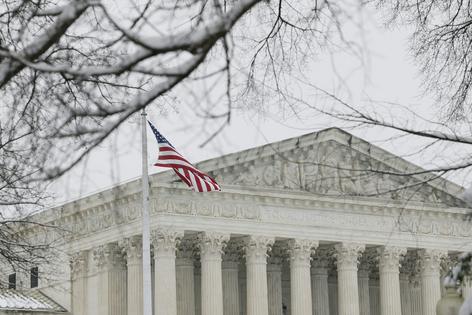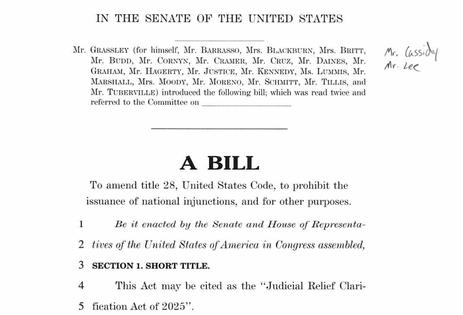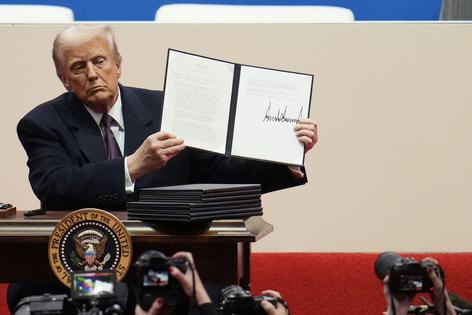How a lone judge can block a Trump order nationwide – and why, from DACA to DOGE, this judicial check on presidents’ power is shaping how the government works
Published in Political News
When presidents try to make big changes through executive orders, they often hit a roadblock: A single federal judge, whether located in Seattle or Miami or anywhere in between, can stop these policies across the entire country.
These court orders have increasingly become a political battleground, increasingly sought by both Republicans and Democrats to fight presidential policies they oppose.
This explains why the Trump administration recently asked the Supreme Court to limit judges’ power to issue what legal experts call “nationwide preliminary injunctions.” Congress also held hearings on curtailing judges’ ability to issue the injunctions.
But what exactly are these injunctions, and why do they matter to everyday Americans?
When the government creates a policy that might violate the Constitution or federal law, affected people can sue in federal court to stop it. While these lawsuits work their way through the courts – a process that often takes years – judges can issue what are called “preliminary injunctions” to temporarily pause the policy if they determine it might cause immediate, irreparable harm.
A “nationwide” injunction – sometimes called a “universal” injunction – goes further by stopping the policy for everyone across the country, not just for the people who filed the lawsuit.
Importantly, these injunctions are designed to be temporary. They merely preserve the status quo until courts can fully examine the case’s merits. But in practice, litigation proceeds so slowly that executive actions blocked by the courts often expire when successor administrations abandon the policies.
Nationwide injunctions aren’t new, but several things have made them more contentious recently.
First, since a closely divided and polarized Congress rarely passes major legislation anymore, presidents rely more on executive orders to get substantive things done. This creates more opportunities to challenge presidential actions in court.
Second, lawyers who want to challenge these orders have gotten better at “judge shopping” – filing cases in districts where they’re likely to get judges who agree with their client’s views.
Third, with growing political division, both parties aim to use these injunctions more aggressively whenever the other party controls the White House.
These legal fights have tangible consequences for millions of Americans.
Take DACA, the common name for the program formally called Deferred Action for Childhood Arrivals, which protects about 500,000 young immigrants from deportation. For more than 10 years, these young immigrants, known as “Dreamers,” have faced constant uncertainty.
That’s because, when President Barack Obama created DACA in 2012 and sought to expand it via executive order in 2015, a Texas judge blocked the expansion with a nationwide injunction. When Trump tried to end DACA, judges in California, New York and Washington, D.C. blocked that move. The program, and the legal challenges to it, continued under President Joe Biden. Now, the second Trump administration faces continued legal challenges over the constitutionality of the DACA program.
More recently, judges have used nationwide injunctions to block several Donald Trump policies. Three different courts stopped the president’s attempt to deny citizenship to babies born to mothers who lack legal permanent residency in the United States. Judges have also temporarily blocked Trump’s efforts to ban transgender people from serving in the military and to freeze some federal funding for a variety of programs.
While much of the current debate focuses on presidential policies, nationwide injunctions have also blocked congressional legislation.
The Corporate Transparency Act, passed in 2021 and originally scheduled to go into effect in 2024, combats financial crimes by requiring businesses to disclose their true owners to the government. A Texas judge blocked this law in 2024 after gun stores challenged it.
In early 2025, the Supreme Court allowed the law to take effect, but the Trump administration announced it simply wouldn’t enforce it – showing how these legal battles can become political power struggles.
Some critics say nationwide injunctions give too much power to a single judge. If lawyers can pick which judges hear their cases, this raises serious questions about fairness.
Supporters argue that these injunctions protect important rights. For example, without nationwide injunctions in the citizenship cases, babies born to mothers without legal permanent residency would be American citizens in some states but not others – an impossible situation.
Congress is considering legislation to limit judges’ ability to grant nationwide injunctions.
The Trump administration has also tried to make it expensive and difficult to challenge its policies in court. In March 2025, Trump ordered government lawyers to demand large cash deposits – called “security bonds” – from anyone seeking an injunction. Though these bonds are already part of existing court rules, judges usually set them at just a few hundred dollars or waive them entirely when people raise constitutional concerns.
Under the new policy, critics worry that “plaintiffs who sue the government could be forced to put up enormous sums of money in order to proceed with their cases.”
Another way to address the concerns about a single judge blocking government action would be to require a three-judge panel to hear cases involving nationwide injunctions, requiring at least two of them to agree. This is similar to how courts handled major civil rights cases in the 1950s and 1960s.
My research on this topic suggests that three judges working together would be less likely to make partisan decisions, while still being able to protect constitutional rights when necessary. Today’s technology also makes it easier for judges in different locations to work together than it was decades ago.
As the Supreme Court weighs in on this debate, the outcome will affect how presidents can implement policies and how much power individual judges have to stop them. Though it might seem like a technical legal issue, it will shape how government works for years to come – as well as the lives of those who live in the U.S.
This article is republished from The Conversation, a nonprofit, independent news organization bringing you facts and trustworthy analysis to help you make sense of our complex world. It was written by: Cassandra Burke Robertson, Case Western Reserve University
Read more:
Trump’s defiance of a federal court order fuels a constitutional crisis − a legal scholar unpacks the complicated case
Trump’s idea to use military to deport over 10 million migrants faces legal, constitutional and practical hurdles
Trump’s use of the Alien Enemies Act to deport Venezuelans to El Salvador sparks legal questions likely to reach the Supreme Court
Cassandra Burke Robertson does not work for, consult, own shares in or receive funding from any company or organization that would benefit from this article, and has disclosed no relevant affiliations beyond their academic appointment.


































































Comments